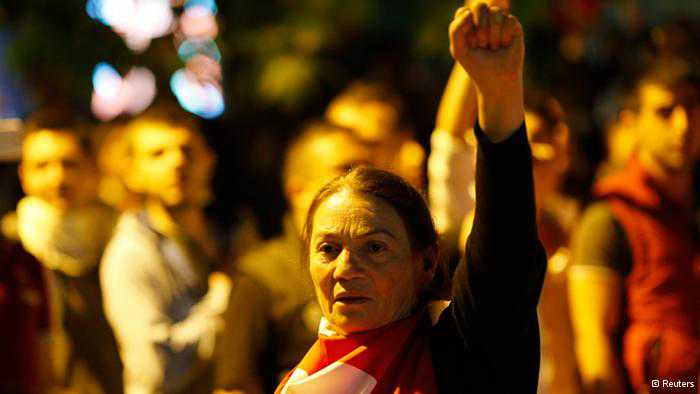Ismail Ertug, a member of the European Parliament and Germany’s Social Democratic Party, spoke with DW about the clash between the Turkish police and demonstrators. The path to EU accession, he says, is still long.

Deutsche Welle: There is mounting criticism from Europe of the excessive force that Minister President Erdogan has used against demonstrators and his limited tolerance of their right to assemble. Is the criticism justified?
Ismail Ertug: The excessive use of force by the police is, I believe, indisputable. This is a development that we are seeing not only right now, but we have seen it on various other occasions in Turkey as well. It has nothing to do with ideology or group thinking. The excessive use of force, sadly, has happened often in the past. So we should be able to say: hey people, this isn’t right! Peaceful protests by citizens and civil society must be allowed. That wasn’t the case last Friday and that’s why the criticism is justified.
Were you surprised how massive the protests became in many cities? How do you explain that?
I believe the political elite have done everything wrong that they could possibly do. If they had allowed the protests and demonstrations to take place peacefully, they would have given people an opportunity to be heard. If officials like President Gul had expressed understanding for people’s concerns, the situation would not have escalated. But the tough rhetoric and unreasonable use of force only added fuel to the protests, which have spread to various provinces in Turkey.
How much influence does Europe have on Prime Minister Erdogan’s government? Can Brussels have any impact?
Ismail Ertug is a member of the European Parliament
I think so, and the European Union is already doing so. European Parliament President Martin Schulz and Lady Ashton, the High Representative for Foreign Affairs and Security Policy, have voiced their concerns, as have others including German Foreign Minister Westerwelle and US government representatives. These are attempts, mostly through appeals, to exert moderate influence. We shouldn’t leave Turkey alone at this point but rather offer some well-intended mediation between those who feel oppressed and the political elite. I believe we can help coordinate and serve as a mediator.
The accession negotiations between the EU and Turkey have been stagnating for years. Would you agree that what’s happening now is probably not very helpful in moving the talks forward?
Correct, the talks have bogged down but for a specific reason: the unresolved issue with Cyprus. And on this issue, there are two sides. On the one side, you have Turkey, which is not prepared to implement the Ankara Protocol [the recognition of Cyprus as a member of the EU]. On the other, you have the behavior of the EU, especially that of former French President Sarkozy who constantly behaved provocatively towards Turkey. That explains the escalation on both sides. Besides that, the EU has problems beyond EU accession at the moment, namely the financial crisis, the economic crisis and youth unemployment. And Turkey can imagine other options right now, given its economic growth and rising importance in foreign policy. I assume that even if the current government doesn’t show it, the recent incidents could be an opportunity for it to reflect on whether the confrontational approach and highly authoritarian leadership are the right policy right now. I see all of this more as an opportunity than a threat. But, of course, we need to wait until the demonstrations die down.
That means that the current demonstrations and the harsh response show that Turkey still lacks what it needs as a democracy to join the European Union?
Of course, Turkey isn’t ready yet. No one expects that. The accession and negotiation phase is a transition phase. Countries that want to join the EU always face a number of years of implementing reforms to become fit for entry. If you look at how long the smaller eastern European countries have required, then you see how difficult it is, especially for Turkey with 74 million people, a multi-ethnic country in a difficult geographical situation. It needs time. No one sees Turkey ready today to join the EU. Change is necessary, also in the way people think, towards a younger generation. These young people have a European education. They have more contact than the current political elite, which grew up in a Turkey that was a closed society for 30 to 40 years. I believe that the way with a younger generation will be simpler, but Turkey still has a long way to go.
Ismail Ertug, 37, has been a member of the European Parliament since 2009. He is a member of the Social Democratic Party representing part of Bavaria. Ertug is a member of the Parliament’s EU-Turkey Committee, which promotes cooperation between the Turkish parliament and the European Parliament. His parents moved to Germany from Turkey in 1972.
via ‘Turkey needs time to change’ | Europe | DW.DE | 04.06.2013.